21 Mar2017
By Conra D. Gist and Tim Mahoney
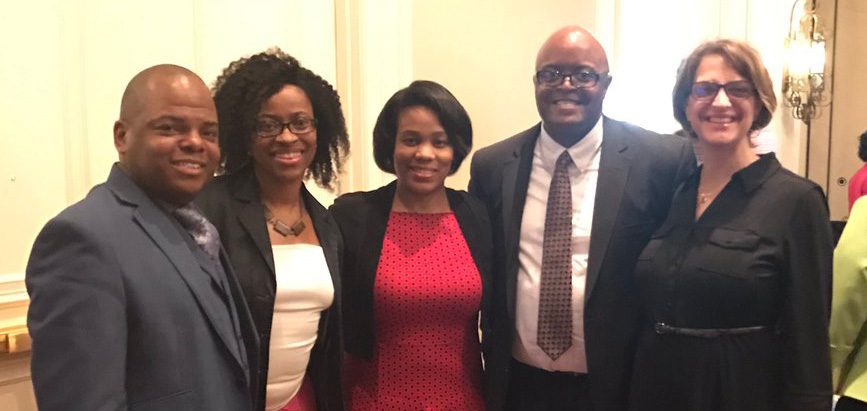
On March 1, the AACTE Diversified Teaching Workforce Institute convened more than 150 teacher educators, aspiring teachers, school leaders, and deans from across the nation to address one of the most pressing issues in educator preparation today: increasing the racial/ethnic diversity of the teacher pipeline.
The event was organized by leaders of the Diversified Teaching Workforce (DTW) Topical Action Group (TAG), with assistance from AACTE’s Department of Member Engagement and Support. Members of the DTW TAG were joined at this inaugural institute by participants from the AACTE Holmes Program, the Black & Hispanic/Latino Male Teachers Initiative Networked Improvement Community, and dozens of others from the broader education community. (See the PDF program for the schedule of sessions, panelists, and other information.)
21 Mar2017
By Sharon Brennan
The views expressed in this post do not necessarily reflect the views of AACTE.
Classrooms today are more diverse than ever. Students come with a wide array of learning modalities, interests, and life experiences and represent increasingly varied socioeconomic, religious, and cultural backgrounds. As of 2014, according to the National Center for Education Statistics, “minorities” now constitute the majority of PK-12 students in U.S. public schools, and more than 10% of students are considered English language learners (ELLs). How can we better prepare our candidates to “reach and teach” all children in today’s schools?
15 Mar2017
By AACTE Committee on Professional Preparation and Accountability
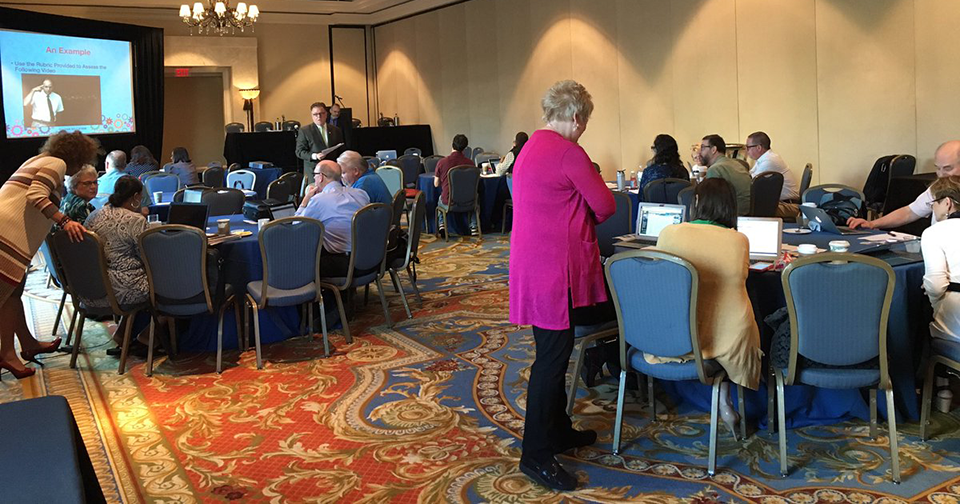
On March 1, approximately 45 educators participated in an AACTE preconference workshop (in advance of the 69th Annual Meeting in Tampa) designed to help them gain knowledge and skills related to accountability, continuous improvement, and quality assurance in their educator programs. Back by popular demand from the 2016 Annual Meeting, the session, “Rubrics, and Validity, and Reliability: Oh My!” was organized and led by members of AACTE’s Committee on Professional Preparation and Accountability.
Over the course of 4 hours, participants reflected on how they are meeting expectations regarding the assessment of teacher candidate performance, compared and contrasted their assessment approaches with participants from other institutions, and considered the impact their candidates are having on PK-12 student learning. In small groups, attendees engaged in hands-on activities introducing them to the rationale for using rubrics, developing and implementing strong holistic and analytical rubrics, ensuring that rubrics provide for the collection of reliable and valid information related to targeted tasks, and increasing understanding about the importance of this work in the context of accountability.
27 Feb2017
By Debra Cano Ramos
This article originally appeared in the Winter/Spring 2017 edition of Titan Magazine and is reprinted with permission.
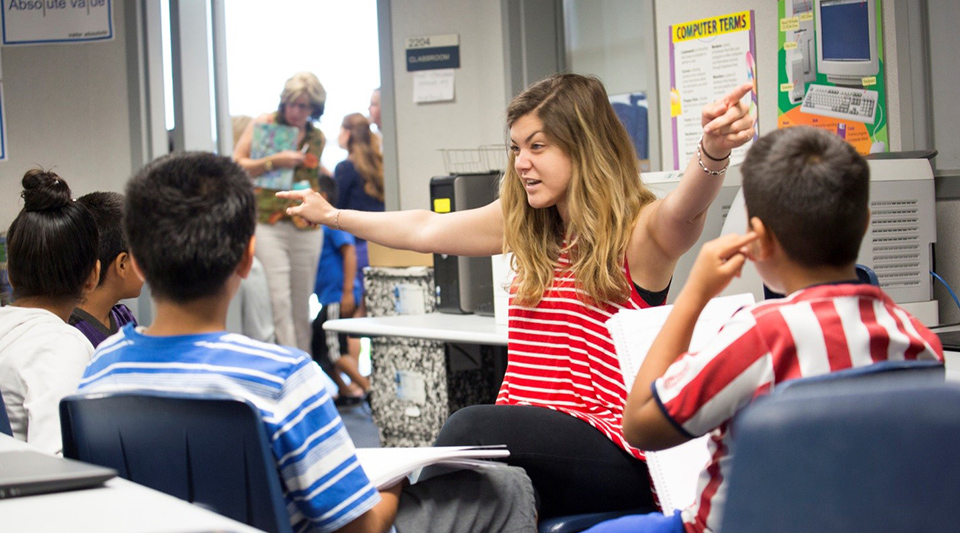
Cal State Fullerton education alumna and camp teacher Alex Lehrer leads her students in acting out a scene from the poems that they created about rainforest animals during a Rainforest Safari Camp.
24 Feb2017
By Conra D. Gist and Tim Mahoney
Are you coming to Tampa for the AACTE Annual Meeting, and looking for activities March 1? Please consider joining a free daylong institute exploring a variety of efforts to diversify the teaching workforce, organized by the AACTE Diversified Teaching Workforce topical action group. We’ll be in the Grand Ballroom Salon E of the Tampa Marriott Waterside starting at 8:00 a.m.
The Diversified Teaching Workforce (DTW) Institute will convene a group of national leaders at colleges and universities across the United States to spotlight and explore innovative efforts for addressing racial/ethnic teacher diversity across five key areas: recruitment and retention, teacher preparation, mentorship, induction and professional development, and advocacy. Recognizing the need to create spaces within professional networks to discuss and unpack the challenges and possibilities for increasing teacher diversity, the institute offers presentations on current research, opportunities to plan in working groups, and panel sessions focused on best practices from teacher preparation and teacher diversity pipeline leaders.
14 Feb2017
By Allen Pratt
The author is chair of AACTE’s newly formed “Preparing Teachers for Rural Schools and Communities” topical action group. The views expressed in this post do not necessarily reflect the views of AACTE.
Rural schools and communities may appear as little more than blips on a map, known perhaps for their relaxed pace of life but largely anonymous to the rest of the world. In reality, though, these communities are a critical thread that holds our country together, and preparing educators for the unique needs of rural students and schools is a vital task.
31 Jan2017
By Tony Meale
The views expressed in this post do not necessarily reflect the views of AACTE.
Last month, faculty from Ohio University’s Patton College of Education joined with teachers from a partner school to participate in an equity-focused leadership summit in Chicago. Two Federal Hocking (OH) Middle School teachers – Robin Hawk, an eighth-grade social studies teacher who led the team, and Tessa Molina, a seventh-grade math teacher – took part in the Inclusion, Equity, and Opportunity Teacher Leadership Summit December 2-4, along with Patton College faculty Bill Elasky, instructor of teacher education and a board of education member at Federal Hocking Local Schools; Mathew Felton, assistant professor of teacher education; and Lisa Harrison, associate professor of teacher education.
10 Jan2017
By John F. Snyder
AACTE is partnering with the American Association for Employment in Education (AAEE) to increase input from educator preparation providers in the organization’s annual teacher supply and demand survey. The views expressed in this post do not necessarily reflect the views of AACTE.
The annual American Association for Employment in Education (AAEE) Educator Supply and Demand Report needs your input! If you have not already done so, please complete this year’s survey by January 27.
19 Dec2016
By Brigid Brennan
The clinical models promoted by the Bank Street Sustainable Funding Project are among the high-quality formats for teacher preparation being studied by AACTE’s Clinical Practice Commission. The study described in this article is not officially connected with AACTE or the Clinical Practice Commission.
The Sustainable Funding Project (SFP) at Bank Street College of Education (NY) seeks educator preparation leaders to participate in a study of clinically rich preparation programs.
Educators agree that sustained preservice clinical practice is essential to ensure teachers enter the classroom well-situated for success. SFP studies how to enable all aspiring teachers to enter the profession through affordable, high-quality programs—programs that include yearlong clinical experiences for teacher candidates—so that every teacher is prepared for the demands of the 21st-century classroom.
13 Dec2016
By Jori S. Beck and Rosemary Q. Flores
The views expressed in this post do not necessarily reflect the views of AACTE.
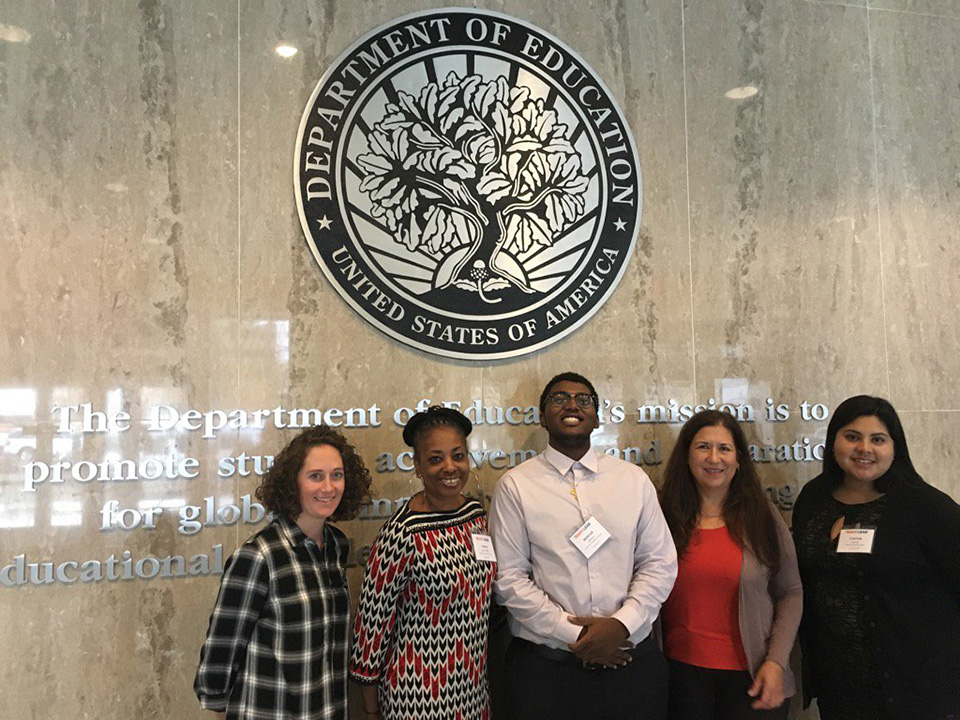
Members of Nevada’s Teach to Lead team at the summit in Washington, DC
We were thrilled to be accepted to participate in the first-ever topical Teach to Lead Summit on Teacher Preparation, held November 2-4 in Washington, DC. Our team worked on a state-funded project that focuses on recruiting high school and undeclared college students of color to education called Abriendo Caminos: Opening Pathways for Students of Color to the Teaching Profession. Our participants included one active teacher, Cynthia Chavez; one undergraduate preservice teacher, Marcus Jackson; a doctoral student and assistant professor, Tonya Walls; and the two of us: Rosemary Q. Flores, a family engagement specialist, and Jori Beck, a teacher preparation representative. The purpose of attending the summit was to further develop our project, and we were provided with ample opportunities from both internal and external critical friends for this work.
13 Dec2016
By Diana Rogers-Adkinson
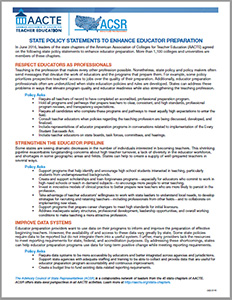
In August, the Advisory Council of State Representatives (ACSR), the governing body of AACTE’s state chapters, released a set of state policy statements to enhance educator preparation. The statements represent the priorities of more than 1,100 educator preparation providers nationwide. AACTE created a customizable template in which state chapters can adapt the statements to meet their state and local needs.
The Missouri Association of Colleges for Teacher Education (MACTE) has been working on tools to advance our message with the state legislature and other key stakeholders. One of our newest assets is the ACSR State Policy Statements, which we adapted by adding a statement on our membership. MACTE has 100% participation among the state’s institutions of higher education that support educator preparation. We felt it was critical to illustrate that we are the collective voice of educator preparation in Missouri.
06 Dec2016
By Daina Lujan, Eurania Isabel Lopez, Judith Munter and Timothy Weekes
California, like many states in the nation, faces a critical shortage of teachers. As California recovers from the Great Recession, teacher hiring needs have steadily increased from a recent low of 10,360 in 2011-2012 to 21,482 in 2015-2016. During the same period, the number of new credentials issued has decreased to a low of fewer than 14,000 candidates in the 2014-2015 school year. This reduction in productivity is reflective of the downward trend in enrollment in teacher preparation programs.

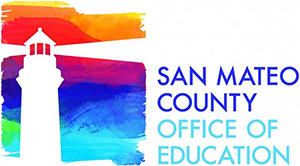
06 Dec2016
By Deborah Snyder
AACTE is partnering with the American Association for Employment in Education (AAEE) to increase input from educator preparation providers in the organization’s annual teacher supply and demand survey.

If you haven’t already done so, could you please take 10-15 minutes to complete the 2016-17 AAEE Supply and Demand Survey? You do not need to be a member of AAEE to participate in the survey, and all respondents will receive an executive summary of the results. The survey is open through January 16.
06 Dec2016
By Shelly Furuness
A version of this article also appeared on the Butler University website.
When the federal Department of Education went looking for ideas on how to prepare teachers better, Butler University’s College of Education answered.
After the nationwide call for teacher preparation programs to submit innovative practice ideas with the potential for growth, Butler became the first Indiana school to be invited to present at a Teach to Lead Summit, the goal of which is to develop and amplify the work of teacher leaders. From nearly 100 submissions, 17 teams were invited to the Teacher Preparation Summit, held November 3-4 in Washington, DC. Participants spent 2 days in intensive strategic planning sessions aimed at identifying obstacles and solutions for spreading innovative best practices in teacher preparation across the country.
01 Dec2016
By Joen Larson
On Election Day, AACTE launched its new Advocacy Center – a one-stop online resource to help guide your federal and state-level advocacy. To that end, you will find handy advocacy guides, state and federal pages with key resources and links, and the opportunity to sign up for a brand-new AACTE Action Alert system.
These alerts are timely, allowing anyone who signs up to participate in e-mail-based advocacy campaigns in support of the profession. We all were reminded of the power of the constituent voice in the recent elections, and we know we need to make our individual voices (and the collective voice of the profession) heard in our states and in Washington, DC, going forward.














